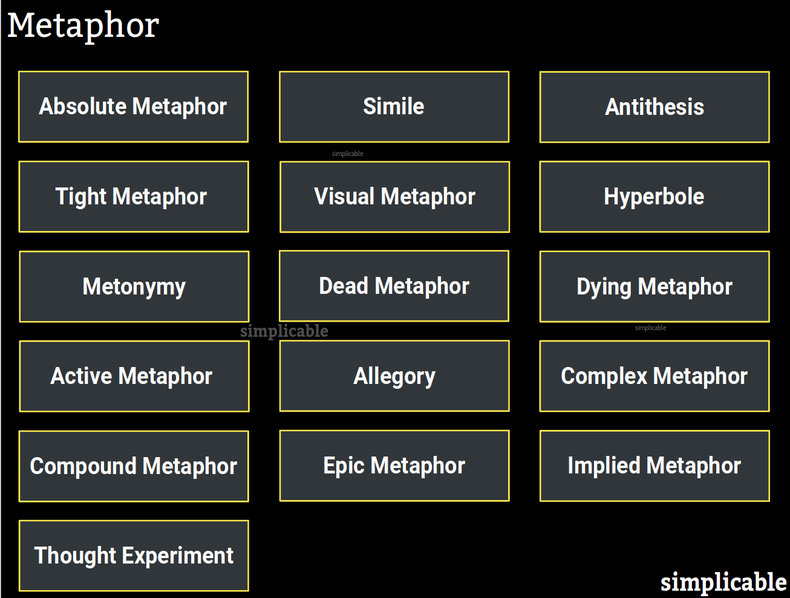
Absolute Metaphor
A metaphor with no obvious similarity between the entities being compared. For example, "the world is a vampire." Absolute metaphors may be used to produce a dramatic or humorous effect.Simile
A metaphor with a weakened comparison that uses a connecting word such as "like", "resembles" or "as a." This can be distinguished from a regular metaphor that uses more direct language such as "is a." the world is like a vampirethey fought like cats and dogshe is as drunk as a skunkAntithesis
A comparison of opposites.It was the best of times, it was the worst of times.~ A Tale of Two Cities, Charles DickensTo err is human; to forgive divine.~ Essay on Criticism, Alexander PopeIt's my experience that folks who have no vices have generally very few virtues.~ Abraham Lincoln (Lincoln attributed this as a quote of a man he met on a stagecoach).
Tight Metaphor
A direct link between a subject and metaphorical meaning that is clear. For example, "she is cool." Also known as a simple metaphor.Visual Metaphor
A visual representation that is meant to be interpreted as a metaphor. Often done to visualize abstract concepts. For example, Antonio Balestra's Justice and Peace Embracing.
Hyperbole
An exaggeration that is meant as a metaphor as opposed to a literal statement. For example, "this cat weighs a ton."Metonymy
Referring to something or someone by the name of an associated thing. For example, referring to the banking industry as Wall Street.Dead Metaphor
A term that was originally a metaphor that has lost its metaphorical meaning with time to become a regular word. For example, the wings of an airplane or the legs of a chair.Dying Metaphor
A metaphor that has been mindlessly repeated until it has become cliche such as "think outside the box." This retains its metaphorical meaning. There is not necessarily any relationship between dead and dying metaphors except they are both typically old.Active Metaphor
Any metaphor that is neither dead nor dying meaning that it retains its metaphorical effect and is not cliche.A two-year old is kind of like having a blender, but you don't have a top for it.~ Jerry Seinfeld
Allegory
An extended metaphor that is used as the theme of a book, work of art or discourse. For example, Pompeo Batoni's War and Peace.
Complex Metaphor
Multiple metaphors in the same metaphor such as "that lends weight to the argument." Both "lend" and "weight" are metaphors that form a single metaphor.Compound Metaphor
Multiple metaphors that describe the same entity. For example, "he's a big fish who's hungry for information."Epic Metaphor
A metaphor that goes into unnecessary detail to produce a dramatic or humorous effect. For example, "this is a problem, this is a big problem, this is a 100-storey problem with a helicopter pad on the roof and a really fast elevator."Implied Metaphor
A metaphor between two things where at least one of the things isn't explicitly mentioned.Ian sailed through the test. (implies a sailboat)Books nourish the mind. (implies food)He was infected with hate. (implies a disease)Thought Experiment
Analogies, including metaphors, are often used as thought experiments to solve problems by reducing extreme complexity to an example anyone can understand. For example, the infinite monkey theorem of probability theory that states that a monkey hitting a keyboard randomly for infinity will almost surely produce the complete works of William Shakespeare.| Overview: Metaphor | ||
Type | ||
Definition | An analogy that directly compares two or more things. | |
Related Concepts | ||








































